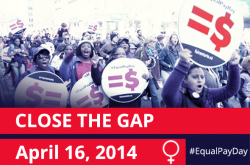This is an archive of news stories and research from the National Union of Public and General Employees. Please see our new site - https://nupge.ca - for the most current information.
On April 16, Equal Pay Day, we continue the push for women's equality and to end gender-based wage discrimination.
 Ottawa (15 April 2014) — Equal Pay Day marks how far into the next year a woman has to work to match what a man has made in the previous year.
Ottawa (15 April 2014) — Equal Pay Day marks how far into the next year a woman has to work to match what a man has made in the previous year.
Equal or Fair Pay means that women should be paid the same as men for work of equal value
Fair pay means that the work women and men do is equally respected and valued. Unfortunately, this is not the reality for many female workers in Canada, where there is still a big gap between what women and men earn. This pay gap is already much less for women who union members, but income equality for all working women is the ultimate goal.
Women have always been in the workforce, but they were often exploited by employers who were keen to use their desperate need for wages as an excuse to pay them less and treat them poorly. As Saskatchewan CCF MP Gladys Strum put it in 1945, "No one has ever objected to women working. The only thing they have ever objected to is paying women for working."
Unions have long been at the forefront of efforts to reduce the gap between women's and men’s wages
Until the 1950s, men and women working side by side, doing exactly the same job were paid differently. This was no secret — the first laws establishing minimum wages in Canada were written for women workers. Unions worked for equal pay for equal work through bargaining and changes to legislation, and won Equal Pay legislation at the provincial and federal levels in the 50s and 60s.
Unfortunately, employers could still get away with continuing to pay women less by hiding unequal pay in differences with job titles, benefits or bonuses. Slight differences in duties could mean big differences in wages for jobs normally held by men, and women were often streamed toward jobs considered “women’s work." So workers had to demand equal pay for similar work through changes in legislation to close these loopholes and ensure that minor differences between jobs could no longer be used as a reason to pay women less.
Achieving equal pay in Canada harder after Conservative's introduce legislation to redefine pay equity
In 2004, the Pay Equity Task Force published a report recommending that a separate act be written in order to ensure that pay equity is in fact established in Canada, not simply in theory but also in practice. Later that year, in March 2009, the Harper government passed its omnibus budget Bill C-10. It included the Public Service Equitable Compensation Act (PSECA), which radically redefined pay equity and the conditions for its application. Thomas Mulcair, of the New Democratic Party, introduced an amendment to remove PSECA from budget Bill C-10, but the amendment failed as the Liberals and the Conservatives voted against it.
Broader consequences for society when women are not paid a fair wage
When women are stuck working in part-time or temporary jobs with low wages, there are broader societal consequences that we all should be concerned about.
Without a fair wage, women may rely more heavily on public services and social supports which has an economic impact in a community. With so many underfunded and stretched services, some women may not get the help they need. Women may have to work multiple jobs in order to pay bills, provide groceries and tend to the needs of the family. Health concerns may increase due to the stress and strain of workload, both within the home and outside of it. Without a fair wage, women may not be able to upgrade their skills to train for new work. The wage gap for women of colour, Aboriginal Women, and women with disabilities is more severe. The lack of a fair wage drives women into poverty and furthers the marginalization of women.
Ways to promote equal pay
There are many ways people can show their support for the equal pay movement on April 16:
- Tell your Facebook friends and Twitter followers about this important date by posting a picture of yourself decked out in your finest crimson clothing.
- Sign the Declaration to demand that the Ontario government and employers finally close the gender pay gap for good!
- Join one of the Equal Pay Day events taking place or create your own.
More information:
NUPGE
The National Union of Public and General Employees (NUPGE) is one of Canada's largest labour organizations with over 340,000 members. Our mission is to improve the lives of working families and to build a stronger Canada by ensuring our common wealth is used for the common good. NUPGE
